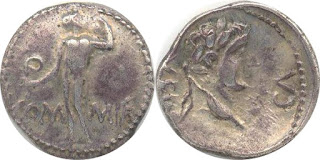Verica - The British
Client King of the Romans.
Verica became king
around 15AD after his elder brother Eppillus. He was the king of the
Atrebates. Rome recognised him as "REX or KING' and they had a
good relationship with each other with diplomatic and trade links.
In the summer of 42AD
Caratacus and Togodumnus, the sons of Cunobelinus, king of the
Catuvellauni, (who recently died), wanted to expand their territory
into Verica's Kingdom which covered south-central Britain (modern
Sussex, Berkshire, and Hampshire).
After the invasion,
Verica ran to Rome for help. Verica, as a 'client king' of Rome asked
Emperor Claudius to reclaim his throne. A year later, Claudius used
this as a pretext for the Roman invasion of Britain.
The future emperor
Vespasian would fight the British Celts in the south near Exeter.
Claudius's successful invasion of Britain brought her under control
of the Roman Empire.
The
Romans restored Verica or at least his heir Tiberius Claudius
Cogidubnus as client-king of the Romans in the Atrebates's territory.
He was a local tribal leader and a Latin speaker who had lived and
been educated in Rome.
This coin was issued
before the Roman conquest when emperor Tiberius was still emperor.
This obverse shows a
nude male figure holding a lituus, a wand or augur's staff in
the right hand, wearing a headpiece with a chin strap, and gazing
skyward holding an object held in his left hand. It has been
suggested (by Chris Rudd) that he is holding a Druid's or serpent's
Egg.
The legend COMMI F
meaning son of Commius. In 51 BC Commius was an ally of Caesar and
then switched sides to help Vercingetorix at the siege of Alesia.
Commius being on the losing side tried to make an offer with Caesar’s
lieutenant Marc
Antony. This being unsuccessful he fled to Britain.
The roman style augur
on this silver coin may allude to druidic fortune telling. The
intended message may be that the future looks good with the son of
Commius.
The reverse shows the
laureate head of Tiberius and the legend Verica. Tiberius was the
emperor of Rome (from 14 to 37 AD) during the period that Verica was
the king of the Atrabetes (10 - 43 AD). It is obviously a
political statement saying, both, "I honour Tiberius and Rome"
and "Liken me to Tiberius". This coin was minted between
25 to 35 AD.
Photo: British Museum
A gold aureus of
Claudius, showing an arch inscribed with "Victory over the
Britons" (Devictis Britannis). It shows a triumphal arch in Rome
honouring emperor Claudius's successful invasion of Britain in 43AD.
These type of coins were minted circa 46-47AD and the arch was dedicated later
in 51AD.
Related Books
Heirs of
King Verica: Culture & Politics in Roman Britain
"#ad" Get the book USA at https://amzn.to/4giNk2Z
"#ad" Get this
book UK at https://amzn.to/3245QYB
Britain is
traditionally considered to have been conquered by the Romans in
AD43. In fact the intervention took place because an important
faction of the Atrebates tribe under King Verica persuaded the
Emperor Claudius to intervene against other Britons who had invaded
its territory. Central southern Britain was liberated by a forced
landing in Chichester harbour and thereafter remained largely free
from the influence of the Roman army. It became Roman under the
patronage of a powerful high king, Tiberius Claudius Togidubnus.
Cultural and artistic life flourished, melding Celtic and Roman
features into a brilliant new civilization which reached its apogee
in the fourth century, when the former protectorate became Britannia
Prima with its capital at Cirencester. After the early fifth century,
the cessation of coinage made the financing of public buildings,
villas and associated works of art impossible, but something survived
of Roman Britain in the distinctive British Latin, the insular
version of Christianity and the style of minor works of art. In a
real sense Britannia Prima was the predecessor of Alfred's Wessex.
This revolutionary interpretation of British life in the first
millennium AD, beginning with Verica's flight and ending with Alfred
and Bishop Asser, is presented as the Roman Britons (well versed in
Ovid & other Roman writers) would doubtless have seen it.
Claudius: A Life From
Beginning to End
"#ad" Get the book USA at
https://amzn.to/3Swjz3t
"#ad" Get this book at
https://amzn.to/3583Dx9
Often portrayed as an
awkward, disfigured, and clumsy man, Claudius was the unlikely ruler
of the Roman Empire from 41 CE to 54 CE. His reign would prove to be
one of the longest of the time even though his rise to the throne did
not come without opposition. Virtually no-one in Claudius’ family
wanted to see him become emperor—only when he turned out to be the
last surviving man of the Julio-Claudian dynasty did he ascend to the
throne.
one ever expected that the boy that was
used as the comparative standard for stupidity by his own mother
would become the emperor of Rome. Yet, he did. Claudius reign was
riddled with conspiracies and attempts on his life by the Senate that
was supposed to serve him. But despite all the opposition to his
rule, Claudius would go on to be an able and efficient leader. He
expanded the Roman Empire more than any other emperor had since the
reign of Augustus.




